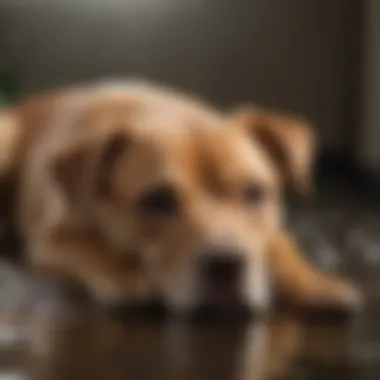Water Diarrhea in Pets: Causes and Treatments Explained


Intro
Water diarrhea in pets can be more than just a nuisance; it’s a pressing concern that stands at the crossroads of health and well-being. When a beloved dog or cat suffers from this issue for days on end, it not only puts their physical health at risk but also stirs anxiety in their owners. Understanding the underlying causes, treatments, and implications of prolonged water diarrhea is imperative. This article embarks on a journey through this topic, aiming to illuminate the various aspects that pet owners and enthusiasts need to be aware of.
Understanding Your Pet
Breed Traits
Every breed comes with its unique characteristics, and like humans, pets can have predispositions to certain health issues. For instance, Boxers are prone to gastrointestinal issues, while Siamese cats may have a more tolerant digestive system. Knowing your pet’s breed is a step toward scrutinizing the potential causes of diarrhea.
Common Temperaments
Pet behavior does influence their health. A highly stressed dog can develop digestion issues that lead to diarrhea. Understanding how your pet responds to different stressors in their environment is crucial. Some pets may have a laid-back demeanor, while others might be easily spooked. This can also guide you in figuring out if stress could be a contributing factor to their digestive woes.
Special Needs
Just like people, pets come equipped with their own special needs. Older pets, for example, might need different dietary regimes or be more sensitive to changes in food. It’s essential to actively observe your pet’s condition swipes throughout their life. Recognizing special needs can help prevent health issues, including diarrhea, from becoming a persistent problem.
Pet Care Essentials
Nutrition and Feeding Guidelines
What goes into your pet’s stomach can greatly affect their digestive health. Evaluating their diet is often the first step when approaching health concerns such as diarrhea. High-quality food that suits your pet's specific needs is paramount. Grain-free or hypoallergenic diets may be ideal for those with sensitivities. You should also maintain a consistent feeding schedule to help regulate their digestive system.
Grooming Tips and Techniques
While grooming may seem unrelated to digestive health, it plays a role. Regular grooming helps in identifying any skin irritations or abnormalities that can accompany or cause diarrhea. For instance, inadvertently chewing on skin irritants or allergens can lead to gastrointestinal disturbance. Keeping your pet clean and well-groomed can go a long way in preventing such issues.
Health and Wellness
Regular veterinary check-ups are crucial in maintaining your pet’s overall health. Vaccination, deworming, and health screenings can rule out any underlying issues that may manifest as diarrhea. Additionally, keeping records of your pet’s health history may provide insights and assist the veterinarian in identifying trends or patterns that need addressing.
Training and Behavior
Basic Training Techniques
Training your pet to respond to commands not only nurtures a stronger bond but also can alleviate potential anxiety that might lead to digestive dilemmas. Teaching basic commands such as 'sit,' 'stay,' or 'come' can provide your pet with a sense of routine and stability, often beneficial for overall health.
Behavioral Problems and Solutions
Should your pet display signs of distress, their behavior may serve as clues to their digestive discomfort. Observing how they interact with their environment can help identify triggers causing anxiety or stress. Intervention through behavioral adjustments or training can minimize such anxiety, potentially reducing related health issues.
Mental Stimulation Activities
Keeping a pet's mind engaged is a vital part of their overall well-being. This is where mental stimulation becomes key. Puzzles, games, and toys designed for cognitive engagement can distract them from stressors in their environment, promoting a healthier mental state and, in turn, better digestion.
Engaging with Your Pet
Interactive Games and Toys
Playtime can serve dual purposes of bonding and relieving stress. Toys that promote interactive play can help both of these aspects, but always monitor your pet to ensure they play safely. Not only does this promote exercise, it can also help prevent the conditions that might lead to water diarrhea.
Safe Outdoor Activities
Activities like walks in the park or supervised trips to the backyard can enhance your pet's mood. Being outdoors can also help with their physical exercise, which is crucial for maintaining digestive health. Just ensure you're aware of any environmental hazards that could pose risks to their health.
Family-Friendly Pet Interactions
Involving all members of the household in caring and engaging with the pet can create a supportive environment. It helps alleviate stress for everyone involved. A well-adjusted pet is generally healthier, and ensuring they are integrated into family activities minimizes feelings of loneliness and anxiety.
Ending
Navigating the waters of prolonged water diarrhea in pets requires a multifaceted approach that encapsulates understanding their unique needs, practicing good care, and addressing both physical and emotional health. Armed with the knowledge from this guide, pet owners can approach this challenging issue with clarity, enabling them to foster healthier lives for their beloved companions.
Prologue to Water Diarrhea
Understanding water diarrhea is crucial for pet owners and animal enthusiasts alike. Diarrhea itself isn’t just a single issue but a symptom that can indicate deeper health problems in pets. When it presents as watery in nature and persists for days, it raises concerns that should not be overlooked. This article delve into the various causes and treatments available to address this troubling concern.
Water diarrhea can lead to severe dehydration and nutrient loss, profoundly impacting a pet’s overall health and well-being. Pet owners must be attuned to the nuances of this condition, especially since early intervention can mitigate the risk of complications. Moreover, recognizing the signs and being proactive in management can make a substantial difference in recovery.
Defining Water Diarrhea
Water diarrhea is characterized primarily by loose and watery stools that may occur several times a day. It differs from other forms of diarrhea in the sheer volume of fluid expelled, which can lead to significant dehydration and electrolyte imbalance. In cases where a pet has water diarrhea for more than 24 hours, it’s vital to take notice and evaluate any accompanying symptoms, such as lethargy, vomiting, or changes in appetite.
The definition extends to how water diarrhea manifests in pets' physiology. The condition disrupts their digestion, making it challenging for them to absorb necessary nutrients effectively. For pet owners, understanding this definition sets the stage for recognizing underlying causes and deciding when to seek medical help.
Difference Between Diarrhea Types
When discussing diarrhea, it’s crucial to differentiate between types to better understand their implications for health. Here are the primary kinds to be aware of:
- Acute Diarrhea: This form of diarrhea appears suddenly and generally lasts for a short time, often due to dietary indiscretion or infections. It may resolve on its own with proper care.
- Chronic Diarrhea: Setting in over a longer period, chronic diarrhea can point to underlying health issues, such as inflammatory bowel disease or parasites. It requires careful diagnostics and treatment plans.
- Water Diarrhea: This is a more specific type that may fall under both acute or chronic, defined by the watery consistency of the stool. The urgency and persistence set it apart from other types.
During the course of this article, various aspects of water diarrhea will be illuminated, including its causes, physiological effects, diagnostic measures, and strategies for effective management. This understanding is not only key for the pet owner but also essential for ensuring pets lead healthy lives free from the discomfort associated with prolonged water diarrhea.
Potential Causes of Prolonged Water Diarrhea


Understanding the underlying causes of prolonged water diarrhea is paramount for pet owners. Recognizing these factors not only aids in identifying the correct treatment but also in preventing future occurrences. Each cause can amplify the severity of the condition, making early detection and intervention essential. Delving deep into these causes helps to clarify the approach to managing this troubling issue effectively, ensuring pets receive the right care in due course.
Infectious Agents
Bacterial Infections
Bacterial infections often involve harmful microorganisms that disrupt the gastrointestinal tract, leading to significant fluid loss. Common culprits include E. coli and Salmonella, both notorious for making pets sick. A critical characteristic of these infections is the speed at which symptoms can appear post-exposure; sometimes, it’s just a matter of hours. This swift reaction allows for prompt identification of the problem, which is a crucial aspect of the article since knowing how quickly symptoms present can help in deciding when to seek veterinary attention. The downside, however, is that without quick action, pets can rapidly decline in health, leading to severe dehydration and other complications.
Viral Infections
Viral infections, such as parvovirus in dogs, can inflict havoc on a pet's system. They’re tricky because they can masquerade as less severe illnesses initially but lead to catastrophic outcomes if not addressed. A defining feature of viral issues is that they often require specific treatments, distinct from bacterial cases, making it imperative to ascertain whether the symptoms stem from a viral or bacterial source right from the start. However, one limitation is that recovery can be prolonged, testing both the patience of the pet owners and the resilience of their pets.
Parasitic Infections
Parasites like Giardia can also stir up trouble in the gut, resulting in prolonged diarrhea. The nature of parasitic infections is usually insidious, often creeping in unnoticed until symptoms get severe. The hallmark of these infections is their chronicity; unlike a sudden bacterial or viral infection, these can linger over time. For pet owners, the challenge is that diagnosing a parasitic infection often demands thorough stool analyses, which adds another layer of complexity to treatment. Nonetheless, treating parasites often guarantees a reasonable degree of success if managed properly, underscoring its significance in understanding this article's theme.
Dietary Factors
Food Allergies
Food allergies are a sneaky culprit behind prolonged water diarrhea in pets. They can stem from common food items like chicken, beef, or dairy, and manifest over time, making them hard to pinpoint. The key feature here is elimination diets which help identify the trigger food. This aspect is central to the article as it stresses the importance of diet in managing gastrointestinal health. However, the downside is that diagnosing food allergies can be a long-winded process, causing frustration for both pet and owner alike.
Sudden Dietary Changes
Sudden changes in diet can send a pet's system into a tailspin. Pets can react negatively when switched from one food to another abruptly; their digestive tracts might not cope well with the sudden change. The defining characteristic is that any alteration should be administered gradually. This is a pivotal point discussed in the article since understanding how to change a pet's diet safely can save them from unnecessary distress and long-term gastrointestinal issues.
Contaminated Food or Water
Contaminated food or water presents a significant risk for pet health, often leading to gastrointestinal upset. Whether due to improper storage or poor hygiene practices, it’s a reality that many pet owners overlook. What makes this discussion essential in the article is the ease at which animals can access contaminated sources. On the upside, prevention is generally straightforward; however, recognition of the issue usually hinges on immediate health changes observed in pets.
Underlying Health Conditions
Inflammatory Bowel Disease
Inflammatory Bowel Disease (IBD) represents a more chronic issue that can aggravate water diarrhea. Pets suffering from IBD often experience inflammation in their intestines that inconsistent absorption of nutrients. This condition's key characteristic is its complexity; diagnosing it often involves a series of tests and can take a long time. It’s beneficial to include this in the article because it illustrates the need for a thorough understanding of gastrointestinal health in pets. A downside is that managing IBD can necessitate long-term medication and dietary changes.
Pancreatitis
Pancreatitis leads to inflammation of the pancreas and can severely impact a pet’s digestive processes. A hallmark of this condition is the sudden onset of symptoms – often seen after a high-fat meal. The significance of this condition in the article lies in the urgent need for medical intervention. While recovery is possible, the management of pancreatitis can be an uphill battle for pet owners and often requires a permanent revision of diets.
Liver Dysfunction
Liver dysfunction can also manifest through water diarrhea alongside other symptoms like jaundice. A crucial aspect of this issue is the liver's role in detoxifying substances in the body; when it fails to work properly, the consequences can be dire. This discussion enriches the article as understanding liver health plays a pivotal role in broader gastrointestinal issues. Unfortunately, liver disorders can be progressive and require persistent management, which can be draining for both pets and their families.
Physiological Effects of Water Diarrhea
Understanding the physiological effects of water diarrhea is key for both pet owners and enthusiasts. This condition doesn't just emerge without consequence; it can lead to severe health concerns if not tackled promptly. The body's response to prolonged diarrhea involves a range of changes that can directly affect a pet's well-being. Recognizing these effects is crucial in enabling owners to respond swiftly and with the right approaches.
Dehydration Risks
One of the most immediate threats posed by water diarrhea is the risk of dehydration. When pets suffer from excessive fluid loss, they can quickly become dehydrated, leading to more serious complications.
- Fluid Loss: A pet with water diarrhea might lose a significant amount of fluids daily compared to those with normal bowel movements. This can be particularly pronounced in smaller animals or those with pre-existing health issues.
- Severe Symptoms: Dehydration can manifest as lethargy, dry gums, sunken eyes, and skin that lacks elasticity. If you pinch the skin and it doesn’t quickly return to its normal shape, that’s a red flag.
- Important Consideration: If dehydration continues unchecked, it can result in kidney failure or shock. Given that pets can’t voice their discomfort like humans do, it’s up to us to be vigilant about their hydration.
"Immediate attention is essential when noticing signs of dehydration in pets. Small symptoms can escalate to serious conditions rather quickly."
Nutrient Absorption Issues
With prolonged bouts of diarrhea, nutrient absorption becomes inefficient, leading to potential malnutrition or nutrient deficiencies. This is particularly concerning because, unlike viruses that can often run their course, nutrient malabsorption can lead to prolonged health issues.
- Impact on the Gut: Diarrhea flushes out not just water but also essential nutrients such as proteins, vitamins, and minerals. If the gut is constantly in turmoil, it struggles to absorb what’s necessary for maintaining health.
- Symptoms to Watch For: Weight loss can occur over time, despite a seemingly normal appetite. Additionally, pets might exhibit dull coats or low energy levels, which are often attributed to deficiencies.
- Long-Term Effects: Sustained nutrient absorption issues can result in chronic health conditions if not addressed swiftly. For example, a dog suffering long-term from diarrhea might develop a compromised immune system, making it more susceptible to infections.
By understanding these physiological effects, pet owners can take preemptive steps and recognize when to seek veterinary evaluations for their furry companions. The welfare of pets relies significantly on close observation and timely intervention when issues like prolonged water diarrhea arise.
Recognizing Symptoms and Diagnosis
Understanding the signs of water diarrhea is fundamental for pet owners, as the health of a pet can change rapidly. Being observant not only helps in identifying symptoms early but also in ensuring that appropriate actions are taken swiftly. This section delves into the noticeable signs that may indicate water diarrhea and outlines the various diagnostic approaches used by veterinary professionals.
Common Signs to Observe
Recognizing water diarrhea isn't just about noting frequency. It encompasses a range of symptoms that can alert pet owners to underlying issues. Keep an eye out for the following common signs:
- Frequency: More than three loose stools a day can be cause for concern.
- Consistency: Watery stools are more indicative of water diarrhea than the occasional soft stool.
- Color and Odor: Changes in color (like brown to yellow foamy liquid) and an unusually strong smell can be red flags.
- Secondary Signs: Watch for lethargy, vomiting, or changes in appetite and drinking habits. These may correlate closely with digestion issues and require immediate attention.
Pet owners must become adept at noticing these signs, as the earlier the condition is recognized, the sooner treatment can begin, reducing risks associated with prolonged diarrhea.
Veterinary Diagnostic Approaches
Once signs of water diarrhea are observed, a visit to the veterinarian is crucial for proper diagnosis and treatment. Different diagnostic approaches help pinpoint the cause of diarrhea, leading to tailored interventions. Here’s how it works:
Physical Examination
The physical examination is often the first step in diagnosing water diarrhea. This hands-on approach enables the vet to assess your pet’s overall health. One key characteristic of this method is its immediate feedback. Vets can palpate the abdomen to check for distension or tenderness, which might indicate underlying conditions that could contribute to diarrhea.
This method is beneficial in quickly identifying severe dehydration or pain, which is critical in an emergency situation. While it can’t diagnose specific infectious agents, it establishes the baseline health of the animal, helping the vet decide the next steps for treatment.
Stool Analysis


Stool analysis takes things up a notch by allowing veterinarians to examine the feces directly. This analysis helps in identifying the presence of pathogens like bacteria or parasites. The key characteristic here is its focus on the specific causes of diarrhea, whether it’s infectious or from gastrointestinal disturbances.
One unique feature of stool analysis is that it can provide insights into the pet’s diet and potential allergies. It’s somewhat of a double-edged sword since, while it’s effective, there can be occasions where results come back inconclusive, necessitating further tests.
Blood Tests
Blood tests are employed to get a clearer picture of the overall health of the pet. This type of analysis can reveal underlying issues that may not be apparent through a physical examination alone. The key aspect of blood tests is their ability to identify systemic health problems that could contribute to diarrhea, such as infections or inflammatory diseases.
A unique advantage of blood tests is they can detect issues like anemia or electrolytic imbalances, both of which are critical when dealing with prolonged water diarrhea. However, veterinary visits can take time and some pet owners face the challenge of their pet having a fear of needles, making this method a little more complicated.
Seeking timely veterinary assistance when symptoms arise can make a significant difference in recovery.
By understanding these diagnostic approaches, pet owners can be better prepared for veterinary visits, contributing to a more efficient evaluation and care for their pets suffering from water diarrhea.
Immediate Care Strategies
Managing prolonged water diarrhea in pets is not just about understanding the condition; it’s about taking immediate, effective steps to ensure the overall health and well-being of your furry companions. Water diarrhea can result in swift dehydration, which can have serious repercussions if not addressed promptly. Immediate care strategies focus on restoring hydration and monitoring the pet's health closely. This section will explore hydration techniques and the significance of monitoring health changes.
Hydration Techniques
When a pet experiences significant fluid loss due to water diarrhea, rehydration becomes a priority. Let’s look closely at two common techniques for restoring their fluid balance.
Oral Rehydration Solutions
Oral rehydration solutions (ORS) are specially designed liquids that help restore lost fluids and vital electrolytes in pets. These are beneficial for mild to moderate dehydration caused by water diarrhea.
A unique feature of ORS is its balanced formulation that includes sodium, potassium, and glucose. This combination allows for optimal absorption in the intestinal tract, making them effective in replenishing essential nutrients lost through diarrheal episodes. ORS can easily be administered by mouth, making it a convenient choice for pet owners.
However, one must take caution. If a pet is vomiting or refusing to drink, using ORS alone may not suffice, and veterinary help may be needed.
Intravenous Fluids
In cases where dehydration is severe, intravenous (IV) fluids become necessary. This method allows for rapid administration of fluids directly into the bloodstream, restoring hydration levels more effectively than oral solutions, especially when pets cannot consume liquids.
The key characteristic of IV fluids is their immediate impact. They can deliver not just fluids but also essential electrolytes efficiently. What's essential here is the supervision by a veterinarian, as they will tailor the type and volume of the fluids to the pet's specific needs.
However, administering IV fluids requires equipment and expertise that only veterinary clinics can provide. Therefore, while it is a highly effective method for severe cases, accessibility can be a critical downside for pet owners in an at-home setting.
Monitoring Health Changes
For a successful recovery from water diarrhea, monitoring health changes is crucial. Observing your pet's behavior can provide important insights into their health status. Regular checks can help identify if symptoms are improving or worsening.
- Check for signs of dehydration: Look for dry gums, excessive thirst, or reduced urine output.
- Watch for changes in behavior: Is your pet more lethargic than usual? Are they eating and drinking normally?
- Record the frequency and consistency of stool: This will help the veterinarian gauge if the treatment is working effectively.
Pet owners should be aware that while managing symptoms at home is helpful, escalating health issues need professional intervention. Pets can sometimes exhibit signs that suggest a serious underlying condition requiring prompt veterinary attention.
"A proactive approach involving hydration and keen observation can make a significant difference in the recovery journey for pets suffering from prolonged water diarrhea."
Immediate care strategies lay the groundwork for a careful and informed approach to managing water diarrhea, ensuring that the furry members of your family get the attention they need.
Long-Term Management of Water Diarrhea
Managing water diarrhea over an extended period isn’t just about stopping the symptoms; it revolves around ensuring that your pet's digestive system functions smoothly in the long haul. Long-term management offers a proactive approach to prevent the recurrence of diarrhea and associated health complications. Thus, it becomes imperative for pet owners to understand the various strategies available to ensure their beloved companions remain healthy and thrive.
Dietary Adjustments
Easily Digestible Foods
Easily digestible foods are key players in the management of prolonged water diarrhea. These foods are specially formulated to reduce the digestive workload on your pet's system. They often contain lower fiber content and higher soluble carbohydrates, making them absorbed more efficiently.
One of the critical characteristics of easily digestible foods is their focus on ingredients that are less likely to cause gastrointestinal upset. For example, rice, boiled chicken, and pumpkin can fall under this category. Pet owners often find these foods beneficial during periods of digestive distress, as they provide necessary nutrients without contributing to further irritation.
- Advantages:
- Disadvantages:
- Alleviates digestive strain.
- Reduces the likelihood of further diarrhea episodes.
- May lack certain nutrients if fed long-term without variety.
The unique feature of these foods is how they help stabilize the gut environment, making them a popular choice for those dealing with ongoing diarrhea issues. Yet, there’s a catch: solely relying on them for an extended duration can lead to nutritional gaps over time.
Elimination Diets
Elimination diets serve as a diagnostic tool and management strategy in addressing water diarrhea. This approach involves removing potential allergens or irritants from your pet's diet, helping to pinpoint specific food sensitivities.
The core characteristic of elimination diets lies in their systematic approach. By introducing one ingredient at a time, pet owners can monitor their pets for any adverse reactions, thereby identifying troublesome components. These diets typically start off with a limited number of ingredients, making them an effective choice for pets that seem to react negatively to various foods.
- Advantages:
- Disadvantages:
- Helps identify food sensitivities effectively.
- Can significantly reduce digestive discomfort once triggers are eliminated.
- Requires diligence and careful record-keeping from pet owners.
Elimination diets stand out as they provide crucial insight into food intolerances and allow for a tailored dietary plan. However, the process can be time-consuming and requires the owner’s strict adherence to their pet’s eating regimen.
Probiotics and Supplements


To further support the gut health of pets experiencing prolonged water diarrhea, incorporating probiotics and various supplements into their regimen can be worthwhile. Probiotics are beneficial bacteria that enhance gut flora balance, which is often disrupted during episodes of diarrhea. Additionally, certain supplements can fortify the digestive system and provide much-needed nutrients.
Supplements containing prebiotics help nurture the growth of the good bacteria already present in the intestines, ideally leading to a more robust gut ecosystem. Regularly including probiotics in your pet’s diet can serve as a preventive measure, promoting digestion and helping to restore gut equilibrium that can be thrown off by prolonged diarrhea.
Adopting a strategy that combines dietary adjustments with probiotics aims for a comprehensive approach, ultimately enhancing your pet's quality of life.
In summary, long-term management of water diarrhea requires a thoughtful blend of dietary adjustments, including easily digestible foods and elimination diets, alongside the use of probiotics and supplements. Understanding these elements empowers pet owners to fortify their pets' health and improve their quality of life.
Potential Complications and Considerations
The journey of understanding water diarrhea in pets doesn't end with recognition and immediate management. Diving into the potential complications and considerations surrounding this issue is essential, especially as it lays the groundwork for long-term pet health and owner peace of mind. Ignoring these complications can lead to a slippery slope of further health issues that can deeply affect both the animal and the owner.
Risk of Chronic Conditions
Chronic water diarrhea can serve as an ominous warning signal for underlying health problems. When a pet experiences diarrhea for an extended period, the continual loss of fluids can lead to dehydration, which masks more serious conditions such as inflammatory bowel disease or even chronic kidney disease.
- The more prolonged the diarrhea, the higher the chance of developing secondary issues like chronic malnutrition and electrolyte imbalances.
- In some cases, persistent diarrhea may lead to structural damage to the intestines. This is quite akin to letting a penny sit in a pool of vinegar for too long—the acid eats away at it, diminishing its integrity over time.
- Pets suffering from chronic conditions may show a range of symptoms: lethargy, weight loss, and decreased appetite can emerge as subtle signs that something is amiss, urging vigilant observation from owners.
In general, the sooner these potential chronic conditions are identified and addressed, the better the outcome will be for both the pet and its human family. The key here is to pay attention and act promptly.
Impact on Quality of Life
A pet's quality of life can change dramatically with water diarrhea that lasts for days. While the physical aspect is vital—such as hydration and nutrition—the emotional well-being of a pet is equally crucial. Imagine being unwell; not only does it physically drain a person or animal, but psychologically, it can leave them feeling quite out of sorts.
- Social withdrawal: Pets often shy away from their usual playfulness. They may hide or seem uninterested in their favorite toys or activities. A fun-loving dog or cat can quickly become a recluse when discomfort overshadows their daily existence.
- Stress for Owners: This condition not only burdens pets but also impacts their owners. Worrying about a beloved pet’s health can create an environment thick with anxiety. Added to vet visits and treatment costs, the emotional toll shouldn’t be underestimated.
- Changing Routines: With persistent water diarrhea, feeding schedules, exercise, and even bathroom routines can be dramatically altered. This upheaval disrupts the flow, creating stress in the daily life of both pet and owner.
In essence, the effects of water diarrhea extend beyond mere physical symptoms. It becomes a labyrinth of emotional and psychological hurdles. Careful management and understanding can mitigate its adverse effects, granting the pet a chance to reclaim their joy-filled life.
Important note: For the sake of your pet’s health—and your own peace of mind—consider reaching out to your veterinarian at the onset of any prolonged symptoms. Early intervention can make a world of difference.
Preventive Measures for Pet Owners
Preventive measures play a pivotal role in ensuring the health and well-being of pets, especially concerning conditions like prolonged water diarrhea. Understanding how to mitigate risks is essential for pet owners. A proactive approach not only helps in averting potential health issues but also fosters a deeper bond between pets and their owners.
"An ounce of prevention is worth a pound of cure."
Adequate prevention can save both pets and owners from distress later on.
Regular Health Check-ups
Having routine check-ups is more than just a recommendation; it’s a necessity. Regular vet visits help in early detection of possible health issues, including those that might lead to water diarrhea. Vets can monitor the overall health of your pet, checking for signs of infections, underlying conditions, and any dietary issues that might arise.
Some specific benefits of regular check-ups include:
- Identifying Issues Early: Health problems don’t usually announce themselves. A vet can catch early signs of illness before they escalate.
- Vaccination Updates: Ensure your pet is up-to-date on vaccinations that could prevent infections causing diarrhea.
- Personalized Advice: Each pet is unique. Regular visits give vets a chance to offer tailored dietary and health advice based on a pet's needs.
- Building Trust: Frequent interactions with the vet can help pets feel more comfortable during examinations, reducing anxiety.
Safe Dietary Practices
Food choices significantly impact pet health. It’s imperative to implement safe dietary practices to minimize the risk of watery stools and related issues. When pets consume contaminated food or abrupt changes in their diet, it can lead to digestive upset. Here are some key aspects to consider:
- Gradual Food Transitions: When changing a pet’s diet, make the switch slowly. A sudden change can lead to gastrointestinal distress. Mixing new food with the old food over a week can help ease this transition.
- Quality Ingredients: Be cautious with the ingredients and sources of pet food. Look for brands that prioritize high-quality and natural ingredients to support digestive health.
- Avoid Table Scraps: It might be tempting to share your food with pets, but many human foods can upset their stomachs. Stick to pet-specific treats and foods.
- Hydration Matters: Encourage your pets to drink plenty of water. Maintaining hydration is critical, especially if they experience any signs of diarrhea.
When to Seek Veterinary Help
Recognizing when to seek veterinary assistance is pivotal for pet owners grappling with the distressing reality of prolonged water diarrhea. The road to recovery can be intricate; thus, understanding the nuances of this condition can make a significant difference in the health and wellbeing of your pet.
Identifying Emergency Signs
As a pet owner, being attuned to your animal's behavior and physical state is crucial. Certain indicators can signal that you need to act fast. Here are some alarming signs to keep an eye on:
- Severe Abdominal Pain: If your pet exhibits consistent signs of discomfort, such as whining or resisting movement, take note.
- Excessive Vomiting: Frequent vomiting can exacerbate dehydration. If this accompanies diarrhea, it could be a red flag.
- Bloody Stool: Any occurrence of blood in the stool should prompt you to seek immediate veterinary attention.
- Lethargy: Uncharacteristic tiredness or a lack of energy can indicate a serious underlying issue.
- Dry Gums or Skin: Check for signs of dehydration by looking at your pet’s gums or pulling up on their skin; if it doesn't snap back quickly, they're likely dehydrated.
These signs could indicate potentially life-threatening conditions requiring swift medical intervention.
Approaching Veterinary Services
Knowing how to engage with veterinary professionals can ease the process significantly. Here are some practical steps to approach this
- Gather Important Information: Before you visit the clinic, collect relevant details about your pet: their age, weight, diet, and the duration and frequency of symptoms.
- Call Ahead: Inform the veterinary practice regarding your pet's condition. This provides them a heads-up and allows them to prepare for your arrival.
- Be Direct and Detailed: At the clinic, be specific about symptoms. The more clarity you can provide regarding your pet's condition, the better assistance the vets can offer.
- Consider Emergency Services: If your usual vet is unavailable and your pet's condition seems dire, locate an emergency veterinary service. Some clinics have partnerships for after-hours emergencies.
"A stitch in time saves nine," they say. Proactive intervention at the right time can prevent complicated health issues down the line.
In summary, being informed and vigilant about your pet’s health can catapult you into action should complications arise from prolonged water diarrhea. Remember, better safe than sorry, and your pet's wellbeing should always come first.
Summary of Key Takeaways
When dealing with a condition as pressing as prolonged water diarrhea in pets, understanding the key points surrounding it is essential. This section aims to condense the vast information throughout the article, making it digestible for pet owners and helping them better navigate their pet's health concerns.
Understanding the Condition
Water diarrhea can be a troubling symptom, often pointing to serious underlying health issues ranging from infections to dietary intolerances. Recognizing the nature of this condition is crucial. It does not just result in inconvenient bathroom trips; it also opens the door to a host of potential complications such as dehydration and nutrient deficiencies. The fluid loss is rapid, and depending on the pet's size and overall health, it can become life-threatening in a matter of days.
By understanding how water diarrhea manifests, pet owners are better equipped to observe changes in their pet's behavior, consumption, and overall wellness. Signs may include increased thirst or lethargy. Simply knowing the normal behavior of their pet can be invaluable.
"Being proactive is key: your pet can’t tell you what’s wrong, so your observations become their voice."
Importance of Prompt Action
Prompt action can make all the difference when it comes to treating prolonged water diarrhea. If pet owners delay seeking veterinary assistance, they may unwittingly place their pets in grave danger. Many people might underestimate the need for timely intervention, thinking it’s just a case of bad food or minor upset. However, when these symptoms persist—especially beyond the 24-hour mark—it's often a sign that the underlying issue is more complex.
The repercussions of inaction can manifest in various ways:
- Dehydration: Rapid fluid loss can lead to significant health issues.
- Chronic Conditions: Some underlying problems may evolve into chronic conditions if not addressed promptly.
- Quality of Life: Prolonged discomfort can affect your pet’s happiness and overall wellbeing.
In summary, understanding the condition and acting promptly places pet owners in a proactive stance, which is not only beneficial but often necessary for the recovery of their beloved companions.



